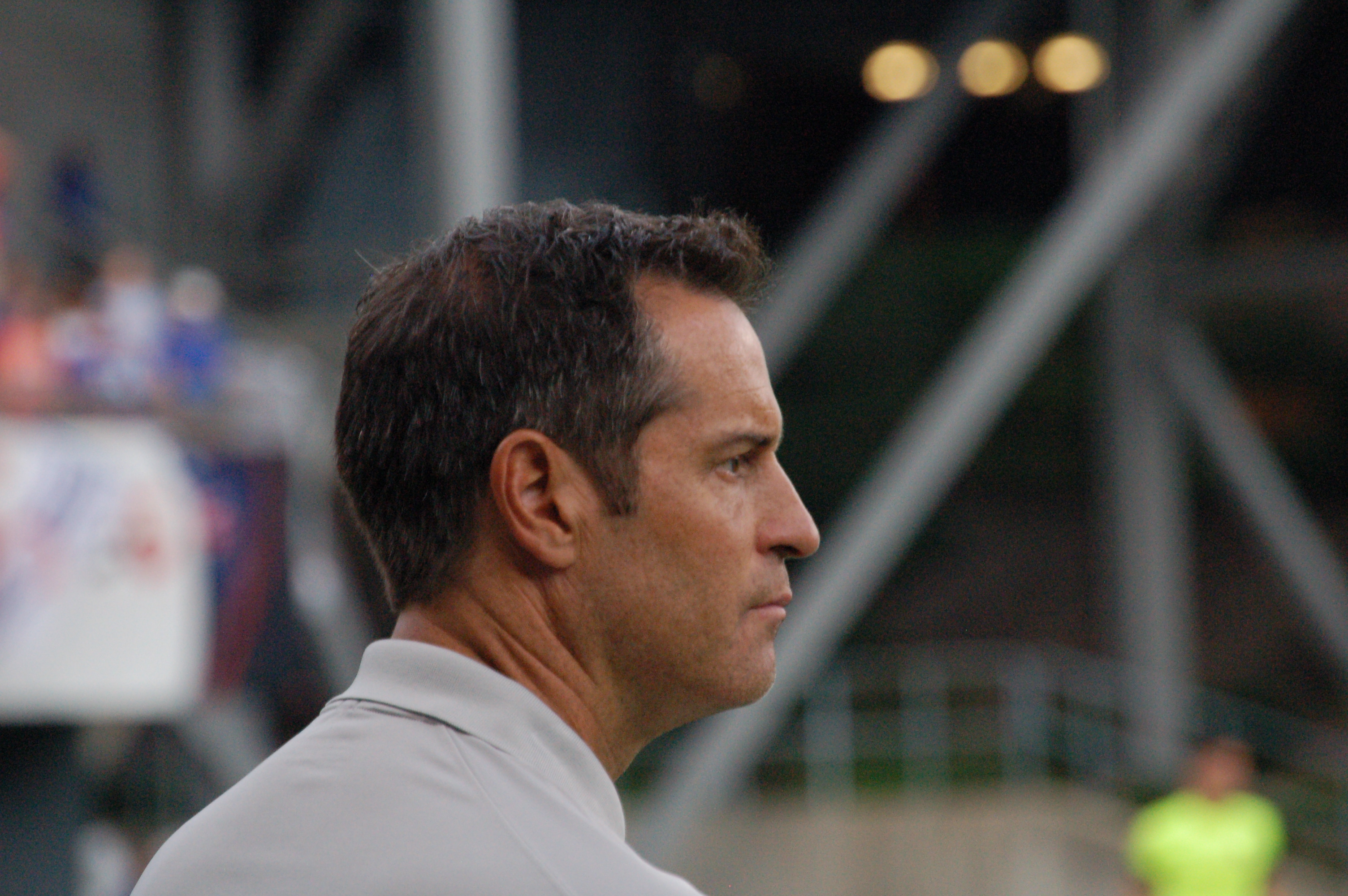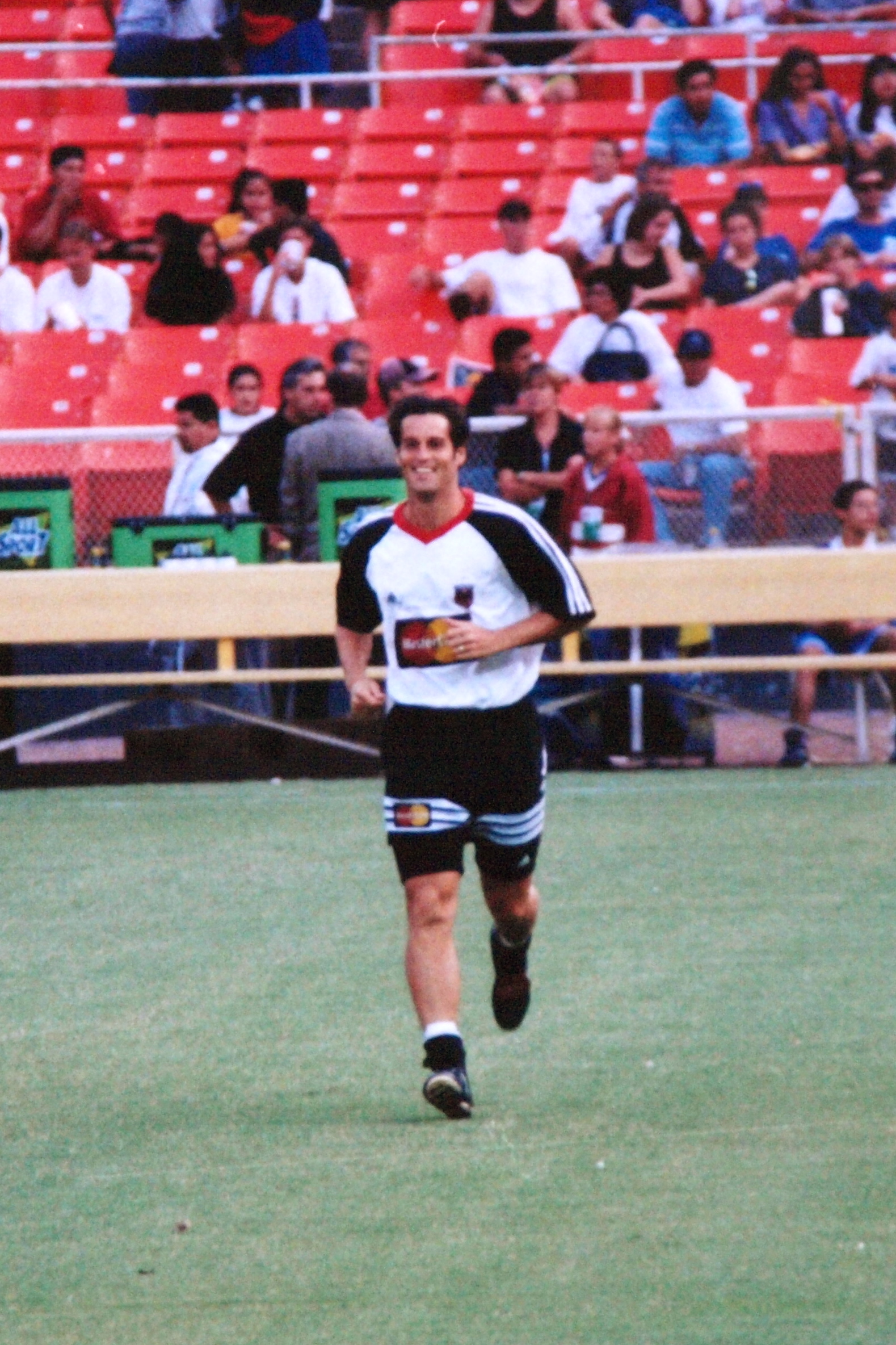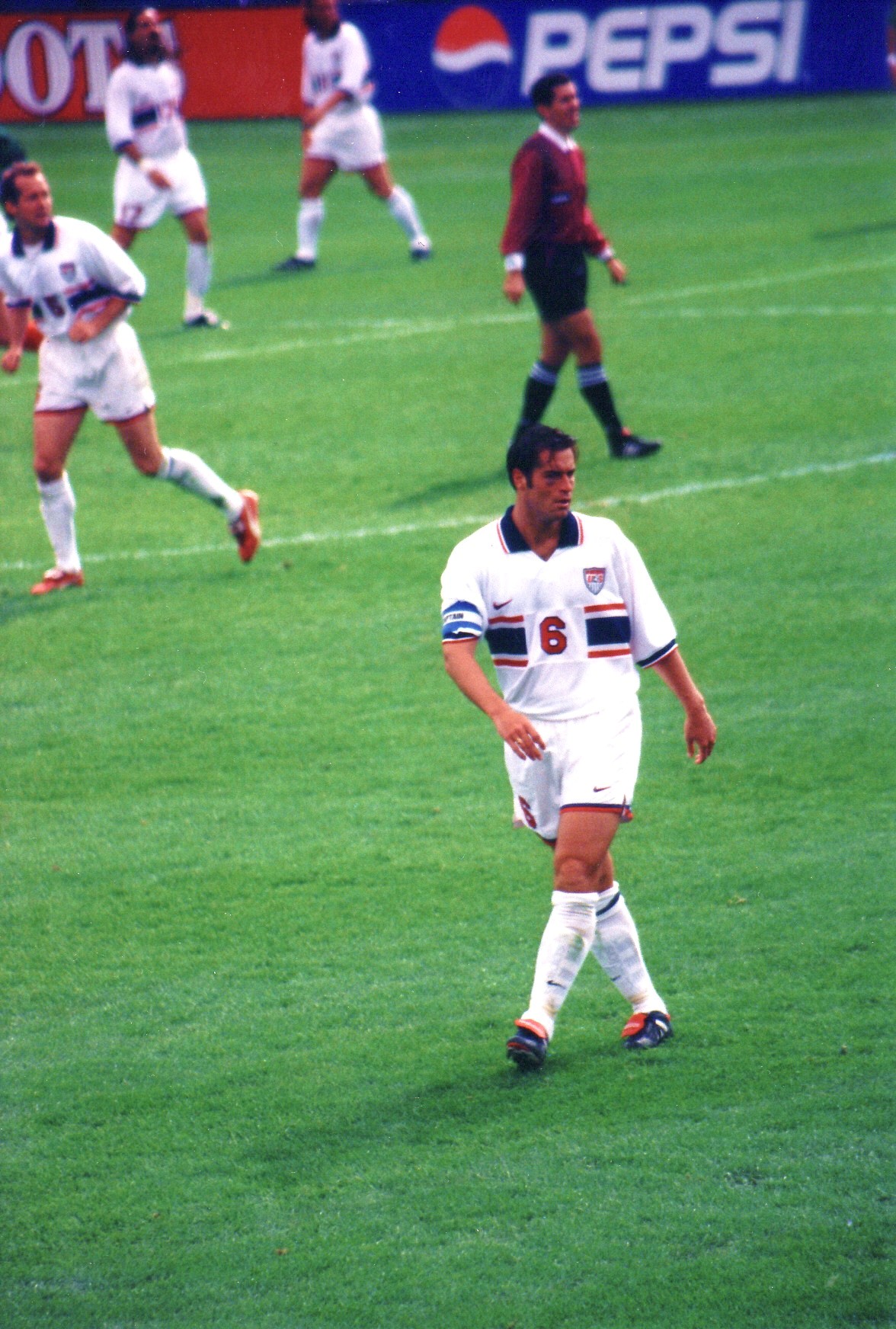1. Early Life and Background
John Harkes' early life was deeply rooted in the vibrant soccer culture of Kearny, New Jersey, a town renowned for its strong soccer tradition. His upbringing and education laid the foundation for his distinguished career in the sport.
1.1. Childhood and Education
Harkes grew up in Kearny, New Jersey, a town recognized as a hotbed for soccer talent. During his youth and high school years, he played alongside future national team colleagues Tony Meola and Tab Ramos. Harkes graduated from Kearny High School in 1985. His high school career was exceptionally successful, as he played in four New Jersey State Interscholastic Athletic Association championship matches. He led his team to an undefeated 24-0 record and the 1984 Group 4 State Championship. For his outstanding performance, he was recognized as the 1984 Parade High School Player of the Year. In 1999, The Star-Ledger named him one of the top ten New Jersey high school soccer players of the 1980s.
1.2. Family and Heritage
Harkes is the first generation born in the United States to Scottish immigrant parents. His father, Jim Harkes, originally from Dundee, Scotland, was a youth team player for Dundee United. Since his time with D.C. United, Harkes has resided in Alexandria, Virginia. John Harkes has two children who have also pursued soccer careers. His daughter, Lauren Harkes, played collegiately at Clemson University. His son, Ian Harkes, followed in his father's footsteps, winning the Hermann Trophy in 2016 as the best player in U.S. college soccer. Ian Harkes has played professionally for John's former clubs, D.C. United and New England Revolution, as well as for Dundee United in Scotland, the club his grandfather played for.
2. Playing Career
John Harkes' playing career spanned amateur and collegiate levels before he made a significant impact in professional leagues both in England and the United States. His journey from college standout to a key figure in the nascent MLS and a pioneer for American players abroad is a testament to his skill and dedication.
2.1. Amateur and College Career
Harkes attended the University of Virginia from 1985 to 1987, where he played under coach Bruce Arena, who would later become his national team coach. He quickly distinguished himself, earning first-team All-American honors in both 1986 and 1987. In 1987, he was awarded the Hermann Trophy, recognizing him as the best player in U.S. college soccer. In 1988, he made the decision to dedicate himself fully to the U.S. national team, coinciding with the 1988 Summer Olympics and the start of the 1990 FIFA World Cup qualifiers.
2.2. Early Professional Career
Harkes began his professional career in 1989 with the Albany Capitals in the American Soccer League (ASL). His strong performances in his inaugural professional season earned him a spot on the league's Best XI.
2.3. Career in England
In 1990, Harkes moved to England to join Sheffield Wednesday in the Football League. During that season, he scored a memorable goal against Derby County, a powerful 35 yd shot that sailed past former England World Cup goalkeeper Peter Shilton, earning him English football's "Goal of the Season" award. That same year, Sheffield Wednesday reached the 1991 League Cup final, where they famously upset Manchester United 1-0. This made Harkes the first American soccer player to appear in the final of a major English tournament. He also became the third American to play at Wembley in this match. In the same season, Sheffield Wednesday secured promotion to the First Division.

In 1993, Harkes made history again by becoming the only American to score in a League Cup Final, though Sheffield Wednesday lost 2-1 to Arsenal. His goal was the second by an American at Wembley Stadium, following Mike Masters' goal in the FA Trophy Final the year prior. A month after this League Cup disappointment, Sheffield Wednesday again faced Arsenal in the FA Cup Final, losing 2-1 in a replay after an initial 1-1 draw.
Harkes continued his career in England, moving to Derby County in the summer of 1993, where he played for two seasons. In 1995, as Major League Soccer (MLS) was preparing for its inaugural season, which was initially planned for the fall of 1995, Harkes was one of the prominent U.S. players signed to a league contract. However, when the league's start was postponed to 1996, Harkes and MLS negotiated a one-year loan move to West Ham United for the 1995-96 season.
2.4. Major League Soccer (MLS) Career

In 1996, John Harkes returned to the United States along with other U.S. national team players based overseas for the launch of Major League Soccer. MLS strategically allocated prominent U.S. players to its inaugural teams to ensure an equitable distribution of talent. Harkes was allocated to D.C. United, becoming the team's first-ever player. In that historic first season, he played a pivotal role in leading the club to win the inaugural MLS Cup and the U.S. Open Cup. D.C. United successfully defended its MLS Cup title in 1997, with Harkes providing the assist for the match-winning goal in the final.
Despite the personal setback of being excluded from the 1998 FIFA World Cup squad, Harkes continued to contribute significantly to D.C. United. He helped the team capture the Supporters' Shield for the best regular-season record in the league, though they ultimately lost to the Chicago Fire in the MLS Cup Final. He also played a crucial role in United becoming the first MLS club to win the CONCACAF Champions' Cup and achieve a surprising victory over Brazil's Vasco da Gama in the Copa Interamericana.
At the end of the 1998 season, Harkes traveled back to England for a two-week trial with Nottingham Forest. On January 28, 1999, he was accepted for a two-month loan period. He made only three appearances for Forest, including the infamous 8-1 defeat to Manchester United, before returning to the U.S.
While Harkes was still in England, D.C. United traded him to the New England Revolution on February 2, 1999. The trade involved New England's first- and second-round picks in the 2000 MLS SuperDraft and future considerations, primarily aimed at freeing up space under D.C. United's salary cap. There was initial uncertainty surrounding the trade, as the Revolution expected Harkes to report by March 15, while Nottingham Forest insisted his loan would continue until the end of the Premier League season. Ultimately, Harkes' loan spell concluded on March 16, allowing him to officially join New England.
Harkes made his debut for the New England Revolution on May 15, 1999, as a 75th-minute substitute against the Columbus Crew. His first start came on May 23 in a 1-0 loss to the LA Galaxy, and he made his home debut on June 5 in a 2-0 loss to the Chicago Fire. He captained the Revolution twice during the 1999 New England Revolution season, on August 6 and October 9, and recorded 8 assists in 22 matches. During the 2000 New England Revolution season, Harkes frequently wore the captain's armband, helping the Revolution reach the MLS Playoffs for the first time since 1997. He scored his first goal for the club on June 3 in a 2-0 victory over the Miami Fusion. Harkes was the sole representative for the Revolution in the 2000 MLS All-Star Game.
Harkes made only five appearances for the Revolution during the 2001 New England Revolution season. On May 11, 2001, the Revolution traded him to the Columbus Crew in exchange for Pato Aguilera and a conditional pick in the 2002 MLS SuperDraft. After an injury-plagued 2002 season with the Crew, John Harkes announced his retirement from professional soccer in 2003.
3. International Career
John Harkes was a cornerstone of the U.S. national team throughout the 1990s, participating in key tournaments and playing a significant role in the team's development on the international stage.
3.1. United States Men's National Soccer Team (USMNT)

John Harkes made his debut for the U.S. national team on March 23, 1987, in a match against Canada. He quickly established himself as a regular fixture in the national squad and was selected to represent the United States at the 1988 Summer Olympics in Seoul. In that tournament, the U.S. team finished with a record of one win, one draw, and one loss, failing to advance past the group stage.
Harkes continued to be a vital part of the national team as they embarked on the qualification process for the 1990 FIFA World Cup. The team secured its spot in the World Cup finals through a dramatic 1-0 away victory over Trinidad and Tobago in the final qualification match.
At the 1990 World Cup in Italy, Harkes was part of a U.S. squad primarily composed of college and semi-professional players. The team suffered a significant 5-1 defeat to Czechoslovakia in their opening match. However, they put up respectable performances in subsequent games, losing narrowly 1-0 to host nation and eventual semi-finalist Italy, and 2-1 to Austria. Despite losing all three group matches, many players from the 1990 squad, including Harkes, Tab Ramos, Tony Meola, Marcelo Balboa, and Eric Wynalda, went on to form the core of the U.S. national team for much of the decade and played a crucial role in the foundational development of Major League Soccer.
The U.S. team performed better as the host nation in the 1994 FIFA World Cup. They achieved a notable 2-1 upset victory over Colombia in a group stage match, which allowed them to advance to the Round of 16. Harkes was involved in the play that led to the Andrés Escobar own goal, which tragically resulted in the Colombian defender's shooting death weeks later. Harkes delivered a cross from the left flank intended for Earnie Stewart, which Escobar attempted to clear but inadvertently sent past his own goalkeeper.
Unfortunately, Harkes missed the Round of 16 match against Brazil due to a one-match suspension, having accumulated two yellow cards during the group stage (against Switzerland and Romania). Brazil went on to win the match 1-0 and ultimately claimed the World Cup title.
3.2. Copa América 1995
In Copa América 1995, the United States participated as a guest team. Harkes played a leading role in the team's surprising run, which included a stunning 3-0 upset of defending champion Argentina. The U.S. team ultimately reached the semi-finals of the tournament. For his exceptional performances throughout the competition, Harkes was named co-Most Valuable Player of the tournament, sharing the honor with Uruguayan legend Enzo Francescoli.
3.3. 1998 FIFA World Cup Controversy
In 1996, prior to the start of the qualification campaign for the 1998 FIFA World Cup, then-head coach Steve Sampson controversially named John Harkes "Captain for Life." This designation implied that Harkes would remain the national team captain as long as he desired and Sampson remained coach. Harkes responded by leading the team in assists during the qualification process, helping the United States secure a spot in their third consecutive World Cup finals.
However, Sampson made the highly controversial decision to leave Harkes off the 1998 World Cup squad, citing only vague "leadership issues" at the time, without offering a full public explanation. The bitterness and irony of this omission, especially given his "Captain for Life" title, served as the inspiration for Harkes' 1999 autobiography, Captain for Life: And Other Temporary Assignments, co-written with Denise Kiernan. In the book, Harkes openly criticized Sampson, stating he lacked "credibility to a group of guys who had hundreds and hundreds of caps among them" and accused him of "putting a huge amount of pressure on young, internationally inexperienced players." He concluded, "I can't think of one thing that Steve did right in the months leading up to the World Cup." The 1998 U.S. team subsequently performed poorly in the World Cup, losing all three group stage matches and finishing last overall.
The true reason for Harkes' dismissal remained a subject of speculation for years. In February 2010, Sampson and former teammate Eric Wynalda publicly revealed that an alleged affair between Harkes and Wynalda's wife, Amy, had prompted Harkes' sudden removal from the team. Wynalda claimed the affair occurred in his home, near his young child's playpen. Sampson later confirmed Wynalda's claim in a 2016 podcast interview with Alexi Lalas, stating that he chose to drop Harkes to restore harmony and accord within the locker room, and remained silent about the true reason out of respect for the privacy of those involved, despite facing intense media criticism for the team's subsequent failure in the World Cup.
3.4. Later International Appearances
Following the 1998 World Cup controversy, Harkes was recalled to the national team in 1999 by his former college coach, Bruce Arena, who had taken over as head coach. He contributed to the United States winning the bronze medal in the 1999 FIFA Confederations Cup that year. Harkes concluded his international career in 2000, having earned 90 caps and scored six goals for the national team.
3.5. International Statistics
| Date | Venue | Opponent | Score | Result | Competition |
|---|---|---|---|---|---|
| August 13, 1989 | Los Angeles, California | South Korea | 1-2 | 1-2 | Friendly |
| February 24, 1990 | Palo Alto, California | Soviet Union | 1-0 | 1-3 | Friendly |
| May 30, 1992 | Washington, D.C. | Republic of Ireland | 3-1 | 3-1 | 1992 U.S. Cup |
| May 6, 1992 | Chicago, Illinois | Italy | 1-1 | 1-1 | 1992 U.S. Cup |
| June 11, 1995 | Boston, Massachusetts | Nigeria | 1-1 | 3-2 | 1995 U.S. Cup |
| June 18, 1995 | Washington, D.C. | Mexico | 3-0 | 4-0 | 1995 U.S. Cup |
4. Coaching Career
Following his retirement as a player, John Harkes transitioned into coaching, taking on roles with professional soccer clubs in the United States.
4.1. Assistant Coaching
In 2006, after concluding his work with D.C. United, Harkes joined New York Red Bulls as an assistant coach under Bruce Arena. He left the team along with Arena when the latter was dismissed.
4.2. FC Cincinnati

In August 2015, the formation of FC Cincinnati, a new franchise in the then-third-division United Soccer League, was announced, with John Harkes appointed as the team's first head coach. In FC Cincinnati's inaugural season in 2016 under Harkes, the club achieved a respectable third-place finish in the USL Eastern Conference with a record of 12 wins, 6 draws, and 4 losses. However, on February 17, 2017, FC Cincinnati announced the dismissal of Harkes ahead of the 2017 season. From outside the club, his dismissal was largely seen as a surprise. Reports later emerged suggesting that the 2016-17 offseason had been "unstructured and somewhat chaotic behind the scenes," according to Pat Brennan of The Cincinnati Enquirer.
4.3. Greenville Triumph SC
In August 2018, Harkes was named the first head coach of Greenville Triumph SC, a new club preparing to join USL League One in 2019. He signed a three-year contract, taking charge of the entire technical side of the organization. In the team's inaugural season, Greenville Triumph finished third in the standings and were the runner-up in the playoffs. The 2020 season marked a significant success for Harkes and the Triumph, as they finished first in the standings and went on to win the playoffs, securing the USL League One championship. For his leadership, Harkes was named the USL League One Coach of the Year. On January 26, 2021, the Triumph extended Harkes' contract through the 2023 season. Under his continued guidance, the Triumph maintained strong performances, finishing second in the standings in both the 2021 and 2022 seasons.
5. Post-retirement Activities
After retiring as a player, John Harkes embarked on a diverse professional life, including prominent roles in media and broadcasting, as well as involvement in community and youth soccer development.
5.1. Media and Broadcasting
Following his playing career, Harkes became a respected soccer analyst and commentator. He served as a color commentator for ESPN's coverage of MLS and U.S. international matches. His broadcasting career included covering major tournaments such as the 2009 FIFA Confederations Cup and the 2010 FIFA World Cup. From 2008 to 2011, he was a main commentator for both ESPN and ABC. From 2012 to 2013, Harkes also worked as a main commentator for Comcast SportsNet's coverage of D.C. United matches and also contributed as a pitch reporter for FOX Sports.
5.2. Other Activities
Beyond his media work, Harkes has been involved in various other endeavors within the soccer community. He served as the director of youth development for D.C. United. In 2010, he joined the committee of America Scores, a charitable organization dedicated to providing after-school programs for elementary and middle school students, supporting long-term youth development.
6. Awards and Recognition
John Harkes has received numerous accolades and honors throughout his distinguished playing and coaching career, recognizing his significant contributions to American soccer.
6.1. National Soccer Hall of Fame
In 2005, John Harkes was inducted into the National Soccer Hall of Fame, a prestigious honor that recognizes individuals who have made outstanding contributions to soccer in the United States.
6.2. Professional and Individual Honors
Player
- League Cup: 1990-91
- MLS Cup: 1996, 1997
- U.S. Open Cup: 1996
- CONCACAF Champions' Cup: 1998
- Copa Interamericana: 1998
- Supporters' Shield: 1998
- MLS All-Star: 1997, 1998, 1999, 2000
- English Football "Goal of the Season": 1990-91
- Hermann Trophy: 1987
- Parade High School Player of the Year: 1984
- Copa América Co-MVP: 1995
Coach
- USL League One Champions: 2020
- USL League One Coach of the Year: 2020
Runner-up
- League Cup runner-up: 1992-93
- FA Cup runner-up: 1992-93
- MLS Cup runner-up: 1998
- USL League One runner-up: 2019
7. Career Statistics
John Harkes' career statistics reflect his extensive playing time across various leagues and international competitions.
| Club performance | League | Cup | League Cup | Continental | Total | |||||||
|---|---|---|---|---|---|---|---|---|---|---|---|---|
| Season | Club | League | Apps | Goals | Apps | Goals | Apps | Goals | Apps | Goals | Apps | Goals |
| England | League | FA Cup | League Cup | Europe | Total | |||||||
| 1990-91 | Sheffield Wednesday | Football League Second Division | 23 | 2 | 0 | 0 | 1 | 0 | 0 | 0 | 24 | 2 |
| 1991-92 | Football League First Division | 29 | 3 | 0 | 0 | 0 | 0 | 0 | 0 | 29 | 3 | |
| 1992-93 | Premier League | 29 | 2 | 2 | 0 | 1 | 1 | 0 | 0 | 32 | 3 | |
| 1993-94 | Derby County | Football League First Division | 32 | 2 | 0 | 0 | 0 | 0 | 0 | 0 | 32 | 2 |
| 1994-95 | 35 | 3 | 0 | 0 | 0 | 0 | 0 | 0 | 35 | 3 | ||
| 1995-96 | West Ham United | Premier League | 12 | 0 | 0 | 0 | 0 | 0 | 0 | 0 | 12 | 0 |
| USA | League | U.S. Open Cup | MLS Cup | CONCACAF | Total | |||||||
| 1996 | D.C. United | MLS | 29 | 3 | 0 | 0 | 6 | 0 | 0 | 0 | 35 | 3 |
| 1997 | 25 | 5 | 1 | 0 | 5 | 0 | 0 | 0 | 31 | 5 | ||
| 1998 | 29 | 6 | 0 | 0 | 6 | 0 | 0 | 0 | 35 | 6 | ||
| 1999 | New England Revolution | 22 | 0 | 0 | 0 | 0 | 0 | 0 | 0 | 22 | 0 | |
| 2000 | 28 | 2 | 1 | 0 | 3 | 0 | 0 | 0 | 32 | 2 | ||
| 2001 | 5 | 0 | 0 | 0 | 0 | 0 | 0 | 0 | 5 | 0 | ||
| 2001 | Columbus Crew | 18 | 0 | 3 | 0 | 2 | 0 | 0 | 0 | 23 | 0 | |
| 2002 | 11 | 0 | 0 | 0 | 0 | 0 | 0 | 0 | 11 | 0 | ||
| Total | England | 160 | 12 | 2 | 0 | 2 | 1 | 0 | 0 | 164 | 13 | |
| USA | 167 | 16 | 5 | 0 | 22 | 0 | 0 | 0 | 194 | 16 | ||
| Career Total | 327 | 28 | 7 | 0 | 24 | 1 | 0 | 0 | 358 | 29 | ||
8. Controversies and Criticisms
John Harkes' career, while marked by significant achievements and pioneering roles, also faced notable controversies, particularly surrounding his exclusion from the 1998 FIFA World Cup squad. This event, and the subsequent revelations, cast a shadow over an otherwise distinguished international career.
The most prominent controversy involved his unexpected and unexplained omission from the 1998 FIFA World Cup roster by then-head coach Steve Sampson. Harkes had been a central figure for the U.S. national team throughout the 1990s and had even been publicly designated "Captain for Life" by Sampson in 1996, prior to the World Cup qualification campaign. Despite leading the team in assists during qualification and helping them secure a spot in the finals, Sampson stated only "leadership issues" as the reason for his exclusion, offering no further public explanation at the time.
This decision sparked widespread debate and criticism, especially after the U.S. team performed poorly in the tournament, losing all three of its group stage matches. Harkes himself addressed the situation in his 1999 autobiography, Captain for Life: And Other Temporary Assignments, co-written with Denise Kiernan. In the book, Harkes expressed his bitterness and openly criticized Sampson's coaching methods and leadership, stating that Sampson lacked credibility and placed undue pressure on younger, less experienced players.
The full details behind Harkes' dismissal remained a subject of intense speculation for over a decade. In February 2010, former teammate Eric Wynalda publicly alleged that Harkes had been having an affair with Wynalda's wife, Amy, and that this affair was the true reason for his removal from the team. Wynalda claimed the affair occurred in his own home, even near his young child's playpen. In a 2016 podcast interview, Steve Sampson confirmed Wynalda's account, explaining that he became aware of the scandal and the brewing feud between Harkes and Wynalda. Sampson stated that he chose to drop Harkes to restore harmony and accord within the team's locker room, and that he had remained silent about the true reason for years out of respect for the privacy of those involved, despite the significant public backlash and the team's poor performance at the World Cup.